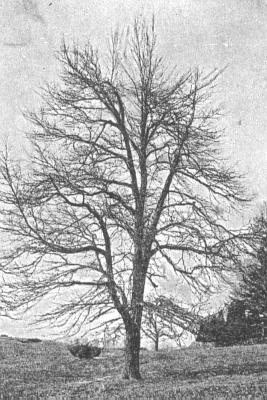

Quercus velutina, Yellow Oak, Yellow-Barked Oak, Quercitron
One of the largest oaks, reaching 150 feet. Dark gray to nearly black bark, very thick and rough with deep vertical furrows and broken ridges.
Distinctive acorn: light reddish brown, with cup covering about half the nut; cup covered by prominent shingle-like scales.
Distributed in poor, sandy, gravelly soils, dry plains, ridges -- rarely in fertile lowlands. Grows relatively quickly.
Deep taproot -- difficult to transplant.
Heavy hard wood, coarse grained, strong but not tough; use value mainly limited to fuel. Bark is rich in tannic acid and was used in tanning, as a source for yellow dye, and as a medicinal astringent.